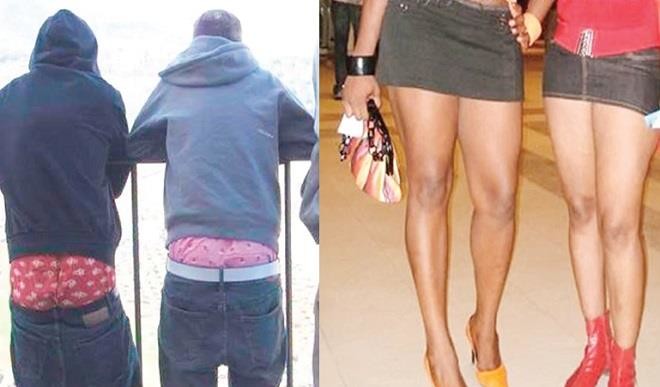Any sane Nigerian should by now have known that there is something wrong with how some youths have chosen to dress in this country. It is short of madness and provocative to see some girls and ladies and even men wearing just underwear to marketplaces and public institutions in the name of fashion. Sadly, some parents and guardians see nothing wrong with that.
And this insanity is spreading very fast in society as some of these ladies dress in this very provocative manner with their little children. The danger in this is that the children will grow up like that, thinking that it is the norm.
Again, many of these girls are from different homes. The pertinent question is what are their parents’ roles or input before their wards leave home for whatever or wherever?
The truth in this matter is that those who dress indecently or expose themselves indecently know that they are indecently dressed, but for lack of morality and demonic instincts in them, they do not deem it fit to change and the thing is getting out of hand.
Recently, the Delta State Command of the Nigeria Police Force warned that individuals found guilty of indecent dressing risked a fine of N50,000 or a sentence of community service. The declaration stirred up some controversies which needed some clarification as most people had mischievously claimed that the rules had infringed on their fundamental human rights.
However, the issue of indecent dressing and exposure is now one of the most discussed topics in Delta State and beyond by the womenfolk and of course, the men too who more often than not wear their trousers on their knees instead of their waists and leave their buttocks and pants open.
For purposes of clarification, indecent exposure is the act of intentionally exposing one’s private parts in public or to someone without consent or often causing offence or alarm to others. Laws regarding indecent exposure vary by jurisdiction but the general principle is that it is considered a crime or offence.
Examples of indecent exposure include exposing oneself in a public place such as a park, street or shopping mall and engaging in lewd, obscene behaviour among others.
On the other hand, Indecent dressing refers to wearing clothing that is considered to be inappropriate, revealing or offensive, often violating social norms or cultural expectations.
Examples of clothing that might be considered indecent in some contexts include revealing tops or shirts, shorts or skirts, and low-cut tight clothing that exposes underwear or body parts.
The pertinent question is why do people indecently expose their bodies in public places? Psychologists say that there are various reasons why people might indecently expose themselves in public places. They include mental health issues.
According to them, some individuals may experience mental health conditions such contribute to their behaviour, and intentional provocation, as some people might intentionally expose themselves to seek attention. Also, it is said that in some cases, individuals might not be aware of the impact of their actions or the cultural norms surrounding dress and behaviour.
In a move aimed at restoring what is described as public decency in many quarters, the Police in Delta State have commenced a clamp down on those with indecent dressing and those who expose themselves indecently in some parts of the State.
However, the campaign has drawn criticism from many civil society groups and residents, who view the clampdown as a violation of personal freedom and a misplacement of priorities by law enforcement agencies.
Critics argue that the operation by the Police lacks a clear legal framework and runs the risk of becoming a tool for harassment, particularly against women. Trust the Nigerian Police what they can do in situations like this, but they should not forget that there is no permission in law that authorises them to arrest citizens for how they choose to dress as long as they are not breaking any public decency laws, which must be clearly defined.
To a large extent, the Delta State Government has taken the right step in the right direction before the situation gets worse. The Ministry of Justice, in a statement, has cleared controversies and insinuations.
According to the statement, ‘’the Delta State Ministry of Justice wishes to categorically state that while the Violence Against Persons Law 2020 criminalises certain acts that may be categorized as indecent exposure of private parts, it is essential to emphasize that the interpretation and application of the law rests exclusively with the court of law. No security operative has the power to impose any punishment on any individual without due process of law”
It continued, “There is no provision of the VAAP Law that authorises law enforcement agents to harass, arrest or punish citizens based on their dress or appearance. Any such action must follow proper legal procedures and be founded on lawful complaints or charges brought before a competent court of law”.
The above from the Delta State Ministry of Justice is clear enough and unambiguous for those concerned to heed and take precautions. Instead of using brute force on Nigerians to drive down the message of indecent dressing/indecent exposure, we want to suggest that the Ministry of Information and the State Bureau for Orientation should be given the job of telling Nigerians about the need to dress properly. The message will sink deeper that way.
Also, the National Orientation Agency (NOA) should be told in clear terms to take the campaign to churches, schools, mosques and marketplaces to spread the message faster and more effectively.
Indecent dressing or exposure is a disgrace to humanity and should be seen as such.


